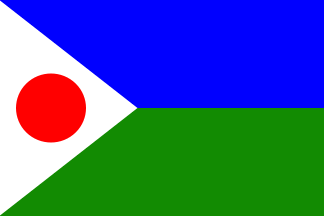 klaus-michael schneider
klaus-michael schneider
Keywords: manabi | chone | san antonio |
Links: FOTW homepage | search | disclaimer and copyright | write us | mirrors

FOTW beschäftigt sich mit der Wissenschaft der Vexillologie (Flaggenkunde).
Alle auf dieser Website dargebotenen Abbildungen dienen ausschließlich der Informationsvermittlung im Sinne der Flaggenkunde.
Wir distanziert uns ausdrücklich von allen hierauf dargestellten Symbolen verfassungsfeindlicher Organisationen.
Last modified: 2021-08-26 by  klaus-michael schneider
klaus-michael schneider
Keywords: manabi | chone | san antonio |
Links: FOTW homepage |
search |
disclaimer and copyright |
write us |
mirrors
 image by
Ivan Sache, 28 May 2018
image by
Ivan Sache, 28 May 2018See also:
The parish of San Antonio (6,705 inhabitants; 3,220 ha) is located in the
southwest of Chone canton (Manabi province).
San Antonio was originally
known as El Peludo. This odd name ("Hairy") refers either to the local
vegetation, characterized by a grass locally known as "peludo" (seemingly,
signal grass, Brachiaria decumbens Stapf), or a man whose body was
fully covered with hair. The resources in cocoa, gold and emeralds attracted
several colonists in the area. Benito Santos is said to have established a river
port to export local products. He is also credited the foundation of the first
manufacture in the province, which produced ice, cloth, matches and cigars.
Santos was succeeded by his son, Elio; the manufacture was subsequently closed,
resulting in the suppression of the village. The modern village was established
by Beatriz Solórzano and her sons.
On 13 June 1914, St. Anthony of
Padua's Day, a battle opposed the Conservatives and the Liberals led by Colonel
Carlos Concha Torres (1864-1918), during the uprising known as the Concha War
(1913-1916). The village of El Peludo was renamed San Antonio to recall the
event. The rural parish of San Antonio was established on 12 December 1944.
http://sanantoniodelpeludo.gob.ec/
Parish website
Ivan Sache, 28 May 2018
The flag of San Antonio is prescribed by an Ordinance issued on 24 November
1988 by the Government of Chone. The flag is horizontally divided blue-green
with a white triangle placed along the hoist and charged with a red disc.
The blue stripe represents river Chone. The green stripe represents the
fertility of the plains and pastures, where "peludo", cocoa and rice are grown.
The white triangle is a symbol of union and aspiration to excellence. The red
disc recalls the battle fought on 13 June 1914.
http://sanantoniodelpeludo.gob.ec/manabi/?p=111
Parish website
Ivan Sache, 28 May 2018
Hosted by: Fanshop-Online.de und Handy-Shop.de
Tipp: Apple iPhone 12 im Shop